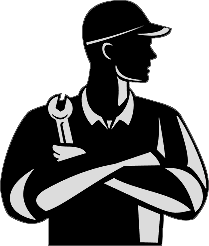
Pressure Washing
Cleaning and degreasing equipment is important in construction processes. Well-maintained equipment operates efficiently and lasts longer, saving owners and operators time and money.
Equipment cleaning involves more than rinsing machinery or wiping it with soap and water. It requires specific detergents and specialized cleaning equipment. With the proper resources, construction site workers and managers can ensure equipment remains efficient and operational for as long as possible.
The Importance of Quality Industrial Equipment Cleaning
Cleaning heavy equipment is necessary for all construction equipment. Many choose to pressure wash their equipment, which removes grime, grease and mud quickly and helps your equipment last longer, protecting your investment. To clean equipment effectively, equipment owners and operators need special equipment, techniques and safety factors.
There are many reasons to wash heavy equipment. Successful construction companies, equipment rental yards and heavy equipment dealerships significantly benefit from keeping their expensive machinery clean and in top-notch condition.
Equipment efficiency and long service life are critical to making sure machines are always operational when needed. A nonworking machine is a nonpaying machine, and cleaning equipment helps machines remain operational to reduce unscheduled downtime.
What Resources Are Necessary to Clean Industrial Equipment Effectively?
Heavy equipment cleaning requires >specialized equipment such as water cannons or pressure washers. It also involves specific techniques that make the best use of cleaning time and materials. Workers must consider safety factors when performing heavy equipment cleaning.
Heavy construction equipment like excavators, loaders and gravel trucks are large, complicated machines that can present hazards to operators and those who clean them regularly. Implementing safety guidelines protects operators and cleaning staff from potential accidents.
Construction Equipment Cleaning Benefits
Keeping heavy machinery clean is professional and should be part of any industrial company’s overall routine and preventive maintenance program. Equipment owners and operators should make cleaning equipment a top priority because it offers the following benefits:
Reduced Wear and Tear
Regular cleaning is an essential part of preventive maintenance. Grime and dirt are abrasive and cause friction in machines, but regular cleaning reduces the strain on moving and fixed parts. Clean machines last much longer than dirty machines, and regular washing makes machines easier to clean than if they gradually collect dirt and grime.
Temperature Control
Clean machines keep cooler than mud-caked and grease-soaked equipment. Although regulated heat is a necessary operating condition with heavy machinery, excessive heat is a killer. Keeping equipment cool can extend a piece of equipment’s life span and prevent it from malfunctioning mid-operation. This positively affects other machines and workers in the production chain.
Reduced Downtime
Keeping construction equipment clean reduces machine downtime. Dirty conditions can cause part failures and breakages, leading to lost time and costly repairs. Regular cleaning removes foreign matter like rocks and branches in tracks. Removing heavy, dried sludge from surfaces reduces excessive weight on booms and buckets.
Inspection Opportunity
Cleaning machines is a great opportunity to inspect for potential problems. Cleaning exposes metal fatigue cracks, oxidization and rusting. Worn or leaking fittings are also obvious when machinery is clean. This allows mechanics to get on top of developing problems before they become serious issues.
Enhanced Safety
Regularly cleaned construction machinery enhances safety. Poorly kept equipment is dangerous to the operator, work crew and others in the machine’s line of fire. Cleaning prevents contaminant buildup around hydraulic and electrical systems, which also prevents potential damage such as a serious blow-out of high-pressure oil or dangerous voltage.
Efficiency
Mechanics are much more efficient when they work on clean machines. Cleaning dislodges foreign debris that’s heavy, volatile or slippery and that can cause falls. Falls are one of the most common construction site risks, so it’s important to prevent them. Effective washing removes objects and buildups that can cause injury from slips and falls, and it prevents workers from being pinched in points that trap kinetic energy. Clean and safe surfaces significantly reduce ergonomic accidents.
Positive Reputation
Clean equipment makes a loud and positive statement. Clients, investors and future customers notice when companies keep their equipment clean, and this increases their trust. Clean and orderly equipment also increases ownership pride. This applies to business owners, supervisors, machine operators and service people. Operators and maintenance technicians take more care when running clean and well-kept equipment.
Products Needed to Wash Heavy Equipment Effectively
Properly washing heavy equipment requires technical knowledge to remove dirt and grease buildup effectively. Using an efficient step-by-step cleaning procedure saves time and energy, and implementing safety procedures keeps washing technicians safe. To develop an efficient and safe cleaning procedure, you need certain products and equipment.
Equipment cleaning products vary in cost and ease of use, but they all have their purpose in ensuring a proper, safe and efficient job. The main products professional machinery cleaners employ are the following:
Personal Protection Equipment
Personal protection equipment is the first product to consider when starting a machinery washing job. Safety is paramount at every construction site, shop and yard. It’s crucial to take personal safety seriously. Construction machinery and designated cleaning equipment are hazardous. Workers need the following personal protective equipment:
- Full-length coveralls: Coveralls protect the entire torso, arms and legs. Today, practically all construction workers wear high-visibility outerwear such as disposable or reusable coveralls. Specialized rainwear such as machinery overalls or two-piece jackets and pants are suitable for this purpose. Insulated protection is important if using hot water washing.
- Protective footwear: Protective footwear is vital. The best footwear is commercial rubber boots with anti-skid soles and toe protection. Upper closure is also important. This prevents hot water from filling up boots.
- Face and eye protection: Wrap-around eyewear or full-face shields protect workers and cleaners from splashes, dirt, chemical burns and eye contamination.
- Gloves: Gloves are mandatory. Workers need to hand-remove chunks of clay and all sizes of stones from machines, and gloves protect them from sharp edges on machine parts. Some workers wear leather gloves when washing, but most find rubber or latex protects hands best.
Pressure Washing Equipment
Pressure washers are mandatory products to use when cleaning construction equipment. A pressure washer is the best tool for removing dirt, grease and grime. Pressure washers force concentrated water streams into tight places like hinges and seams that are impossible to reach with hand brushing.
High-pressure washing equipment consists of pressure washers and high-pressure water cannons. Both perform similar functions but at different scales. Pressure washers are small-scale devices with a limited amount of water flow. They have high pressures between 2,500 and 3,000 pounds per square inch (PSI) but their capacity is limited to about 5-10 gallons per minute (GPM). Pressure washers are equipped with small diameter hoses, usually ½ inch.
Water cannons are much larger than pressure washers. They have lower pressure rates, but water cannons flow at 20-150 GPM or more. That’s 4-15 times the rate of a small-scale pressure washer. Water cannons use fire-type hoses with 1 to 1-½-inch diameters and have adjustable nozzles.
Water cannons are typically found on commercial equipment washing stations that have dedicated closed-loop wash racks. They expel large volumes of water that’s captured, cleaned and recycled. Both types of high-pressure washers are capable of using hot and cold water. Often, pressure washers and cannons operate in tandem with cannons doing the big removal and overall final rinse. Pressure washers perform fine detailing.
Heavy Equipment Wash Pads and Racks
There’s no substitute for using a professionally designed and built wash pad, which is also known as a wash rack. Many jurisdictions regulate wash locations to ensure they comply with environmental compliance. Laws prohibit contaminated construction equipment washings from entering open surfaces and groundwater reservoirs.
Non-compliance with laws can result in heavy fines and personal jail time, not to mention being environmentally irresponsible. In addition, containing contaminated wash water can also protect the property owner or renter from a very expensive soil and groundwater cleanup.
Properly constructed wash pads and racks are built with water containment and recycling systems. Wash pads should be self-contained and enclosed to prevent wash water and all its pollutants from escaping into the outer environment. This knocks dirt, grease and other contaminants free so they can collect inside sumps.
Closed-loop wash operations or wash racks capture and recycle excess water in a contained system, filtering it back to workable gray water where it’s continually reused.


